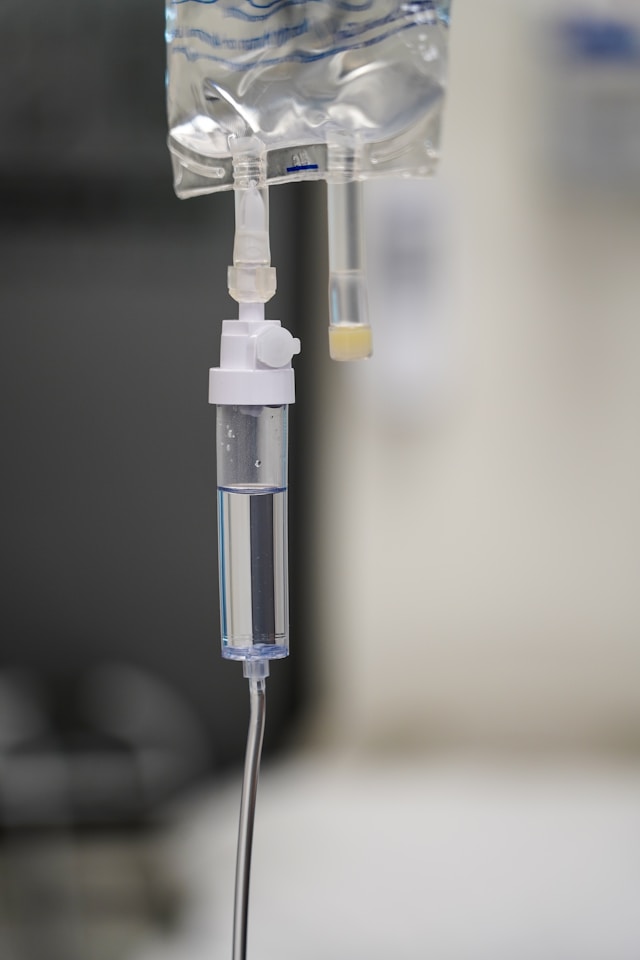
How Long Do Infusions Take? (By Treatment Type)


Dr. Chen is a board-certified immunologist with over 15 years of experience treating autoimmune and immunodeficiency disorders. She specializes in IVIG therapy and has published extensively on immune system treatments.
Medical Disclaimer
One of the most common questions patients ask when starting infusion therapy is "How long will I be there?" Whether you're trying to coordinate with work, arrange childcare, or simply plan your day, knowing what to expect in terms of time commitment is important. The answer varies significantly depending on your specific medication, but understanding the typical timeframes can help you schedule appointments and prepare accordingly. This guide breaks down infusion times by treatment type so you know exactly what to expect.
Key Highlights
- Infusion times range from 30 minutes to 4+ hours depending on your medication, with most biologic infusions taking 1-3 hours.
- Your first infusion typically takes longer than subsequent treatments because medications are given more slowly while you're monitored for reactions.
- Total appointment time includes check-in, pre-infusion assessment, the infusion itself, and post-infusion monitoring—plan for 1-2 hours beyond your actual infusion time.
Why Infusion Times Vary
Infusion duration depends primarily on the specific medication you're receiving. Each drug has been studied extensively to determine the safest and most effective infusion rate. Some medications can be given quickly without causing discomfort, while others must be administered slowly to minimize side effects or prevent infusion reactions.
The concentration of your medication, your body weight (some doses are weight-based), and how well you've tolerated previous infusions all play a role in determining how long your treatment will take. According to the National Institutes of Health, proper infusion timing is carefully calculated to balance effectiveness with patient safety and comfort.
Factors That Affect Your Infusion Duration
Several factors influence how long you'll spend receiving your infusion:
Your Medication and Dose: Different medications have different recommended infusion rates. A low dose of one medication might infuse in 30 minutes, while a standard dose of another could take 3 hours.
First Infusion vs. Maintenance Infusions: Your initial infusion is almost always longer because healthcare providers give the medication more slowly while monitoring you closely for any reactions. Once your medical team knows you tolerate the medication well, subsequent infusions may be shortened.
Your Tolerance and History: If you've never had reactions and tolerate your medication well over several infusions, your doctor may approve a faster infusion rate. Conversely, if you've experienced minor reactions, your team may slow the rate or add pre-medications, which extends your total time.
Pre-Medications: Some patients receive pre-medications (like antihistamines or acetaminophen) before their infusion to prevent reactions. These add 15-30 minutes to your appointment but can make your infusion more comfortable.
Your Body Weight: Weight-based dosing means larger patients may receive more medication, which can take longer to infuse, though this doesn't apply to all medications.
Infusion Times by Treatment Type
Here's a comprehensive breakdown of typical infusion times for common medications and treatment types. Keep in mind these are general ranges—your specific experience may vary.
Biologic Infusions for Autoimmune Conditions
Remicade (Infliximab): Initial infusions typically take 2-3 hours, with some patients able to reduce to 1-2 hours after several successful treatments. Remicade is one of the most commonly prescribed biologic infusions for conditions like rheumatoid arthritis, Crohn's disease, and ulcerative colitis. The Crohn's & Colitis Foundation notes that while the standard infusion time is around 2 hours, some infusion centers offer accelerated protocols after the first few doses.
Entyvio (Vedolizumab): Standard infusion time is approximately 30 minutes. This is one of the shorter biologic infusions, making it convenient for patients with inflammatory bowel disease who need regular treatments.
Stelara (Ustekinumab): When given by infusion (typically the first dose only, with subsequent doses given as injections), the infusion takes about 1 hour. Most patients transition to at-home injections after their initial infusion.
Orencia (Abatacept): First infusion usually takes about 60 minutes, with the potential to shorten to 30 minutes for subsequent infusions if well-tolerated. Used primarily for rheumatoid arthritis and psoriatic arthritis.
Simponi Aria (Golimumab): Infusion time is typically 30 minutes, making it one of the faster biologic options for rheumatoid arthritis, psoriatic arthritis, and ankylosing spondylitis.
Actemra (Tocilizumab): Standard infusion time is about 1 hour. Used for rheumatoid arthritis and other inflammatory conditions.
Multiple Sclerosis Infusions
Ocrevus (Ocrelizumab): First infusion is given in two parts, each taking approximately 2.5 hours, scheduled two weeks apart. Subsequent maintenance infusions every six months typically take 3-4 hours. The longer duration allows for careful monitoring, as Ocrevus is a powerful medication that significantly impacts the immune system.
Tysabri (Natalizumab): Standard infusion time is 1 hour, with an additional 1 hour of post-infusion monitoring. The total appointment time is generally 2-2.5 hours.
Lemtrada (Alemtuzumab): This medication requires 5 consecutive days of infusions during the first course, with each infusion taking about 4 hours. A second course of 3 consecutive days is typically given one year later. According to the National Multiple Sclerosis Society, the intensive nature of Lemtrada treatment requires significant time commitment but offers long-lasting benefits.
IVIG (Immunoglobulin) Therapy
IVIG infusions typically take 2-4 hours, though this can vary significantly based on your dose and tolerance. Patients receiving IVIG for primary immune deficiency, CIDP, or other conditions often start with slower infusion rates (taking 4-5 hours) and may gradually increase to faster rates (2-3 hours) as their body adjusts to treatment.
IVIG is usually given every 3-4 weeks, and many patients find that after several successful infusions, their healthcare team can safely increase the infusion rate. Some patients who tolerate IVIG very well may complete infusions in as little as 90 minutes, while others require the full 4-5 hours to minimize side effects like headaches.
Iron Infusions
Iron infusion duration depends on the specific formulation:
Injectafer (Ferric Carboxymaltose): 15-30 minutes per infusion. Most patients need two infusions given one week apart, making this one of the fastest iron replacement options.
Venofer (Iron Sucrose): 2-3 hours for a full dose, though it's often given in divided doses over multiple sessions.
Feraheme (Ferumoxytol): 15 minutes per infusion. Like Injectafer, usually given as two infusions spaced one week apart.
Monoferric (Ferric Derisomaltose): 20 minutes for a single, complete dose infusion. This newer formulation allows for full iron replacement in one appointment.
The American Society of Hematology emphasizes that iron infusions are generally quick procedures, making them convenient for patients with iron deficiency anemia who haven't responded to oral supplements.
Monoclonal Antibody Infusions for Migraines
Vyepti (Eptinezumab): 30 minutes per infusion. This migraine prevention medication is given every 3 months and is one of the shortest infusion appointments patients experience.
Bone Strengthening Infusions
Reclast (Zoledronic Acid): 15-30 minutes for the infusion itself. Given once yearly or every two years for osteoporosis treatment. Despite the short infusion time, patients typically remain for post-infusion monitoring for about an hour.
Prolia (Denosumab): While technically an injection rather than an infusion, this osteoporosis treatment is sometimes given in infusion centers and takes only a few minutes to administer.
Other Common Infusion Therapies
Rituxan (Rituximab): First infusion typically takes 4-6 hours due to the need for slow administration and careful monitoring. Subsequent infusions may be shortened to 2-4 hours once tolerance is established. Used for various autoimmune conditions and some blood disorders.
Benlysta (Belimumab): Standard infusion time is 1 hour, used primarily for lupus treatment.
Saphnelo (Anifrolumab): 30 minutes per infusion, another lupus treatment option.
Quick Reference: Common Infusion Times
Medication
First Infusion
Subsequent Infusions
Frequency
Remicade
2-3 hours
1-2 hours
Every 8 weeks
Entyvio
30 minutes
30 minutes
Every 8 weeks
Ocrevus
2.5 hours (×2)
3-4 hours
Every 6 months
Tysabri
1 hour
1 hour
Every 4 weeks
IVIG
3-5 hours
2-4 hours
Every 3-4 weeks
Injectafer
15-30 minutes
15-30 minutes
Two doses, 1 week apart
Vyepti
30 minutes
30 minutes
Every 3 months
Reclast
15-30 minutes
15-30 minutes
Yearly
Rituxan
4-6 hours
2-4 hours
Varies by condition
Orencia
60 minutes
30-60 minutes
Every 4 weeks
First Infusion vs. Subsequent Infusions: What Changes
Your first infusion of any medication almost always takes longer than subsequent treatments. Healthcare providers use a cautious "start low and go slow" approach to ensure you tolerate the medication safely.
During your first infusion, the medication is delivered at the slowest approved rate while nurses monitor you closely for any signs of infusion reactions. These reactions—while uncommon—are most likely to occur during initial exposure to a new medication. Your medical team checks your vital signs more frequently and watches for symptoms like itching, rash, difficulty breathing, or changes in blood pressure.
If you tolerate your first infusion well, your doctor may approve a faster infusion rate for subsequent treatments. Some medications have established protocols that gradually reduce infusion time over the first 3-4 treatments. For example, a medication that takes 3 hours initially might eventually be given in 90 minutes once your body has demonstrated good tolerance.
According to the Mayo Clinic, this gradual approach balances safety with convenience, allowing patients to spend less time in the infusion center as their treatment progresses.
Total Appointment Time vs. Infusion Time
It's important to understand that your actual infusion time is just one component of your total appointment duration. When planning your schedule, account for these additional elements:
Check-In and Pre-Infusion Assessment (15-30 minutes): Paperwork, insurance verification, vital signs, and review of your current symptoms and medications.
IV Placement (5-15 minutes): Time for your nurse to place your IV catheter and ensure it's functioning properly.
Pre-Medications (15-30 minutes if needed): Some patients receive antihistamines, acetaminophen, or other medications before their primary infusion.
The Infusion Itself (Variable): This is the time listed in the sections above.
Post-Infusion Monitoring (15-60 minutes): After your infusion completes, you'll be observed to ensure you're not having delayed reactions. First-time infusions typically require longer monitoring periods.
IV Removal and Discharge (5-10 minutes): Final vital signs check, IV removal, scheduling your next appointment, and discharge instructions.
For example, if your medication has a 1-hour infusion time, plan for approximately 2-2.5 hours total for your appointment. For a 3-hour infusion, expect to be at the center for 4-5 hours total.
Many infusion centers try to give patients accurate time estimates when scheduling, but remember that infusion appointments can occasionally run longer if you need extra monitoring or if the center experiences scheduling delays.
Tips for Managing Longer Infusions
If you're facing multi-hour infusion appointments, these strategies can help make the time more comfortable and productive:
Bring Entertainment: Download movies or shows to watch offline, bring a good book or e-reader, or catch up on podcasts. Many patients use infusion time to enjoy entertainment they normally don't have time for.
Stay Productive: If you prefer to work during your infusion, bring your laptop or tablet. Many infusion centers offer Wi-Fi, making this a viable option for remote workers.
Plan for Comfort: Bring a sweater, your own pillow, or blanket. Wear comfortable, loose clothing. Consider bringing snacks and a refillable water bottle.
Schedule Strategically: If possible, schedule longer infusions on days when you have fewer obligations. Some patients prefer morning appointments to get them done early, while others prefer afternoons so they don't have to rush.
Use the Time for Self-Care: Some patients use infusion time for meditation, journaling, or simply resting. It can be a forced break from the busyness of daily life.
Bring a Companion: For longer infusions, having a friend or family member with you can make the time pass more quickly. Check your infusion center's visitor policy.
Frequently Asked Questions
How long does a Remicade infusion take?
Remicade infusions typically take 2-3 hours for your first infusion and may be shortened to 1-2 hours for subsequent infusions once your healthcare team confirms you tolerate the medication well. The total appointment time, including check-in and post-infusion monitoring, is usually 3-4 hours for initial treatments.
How long does IVIG infusion take?
IVIG infusions generally take 2-4 hours, though initial infusions may take up to 5 hours to ensure safe tolerance. The duration depends on your dose, body weight, and how well you tolerate the infusion rate. After several successful infusions, many patients can safely receive IVIG in 2-3 hours.
Can infusion time be shortened after my first treatment?
Yes, many medications can be given more quickly after you've demonstrated good tolerance during initial infusions. Your doctor will evaluate your response and may approve a faster infusion rate for subsequent treatments. However, not all medications can be accelerated, and safety always takes priority over convenience.
Do I need to stay after my infusion is done?
Yes, you'll need to remain at the infusion center for post-infusion monitoring, typically 15-60 minutes depending on your medication and whether it's your first infusion. This observation period allows your healthcare team to ensure you're not experiencing delayed reactions before you leave.
What's the shortest infusion therapy appointment?
Some of the shortest infusion appointments are for medications like Vyepti (30 minutes), Entyvio (30 minutes), and certain iron infusions like Injectafer (15-30 minutes). However, even with these quick infusions, plan for about 90 minutes to 2 hours total when accounting for check-in, IV placement, the infusion, and post-infusion monitoring.
Plan Your Infusion Schedule with Confidence
Understanding how long your specific infusion will take helps you coordinate work, family responsibilities, and other commitments around your treatment schedule. While infusion therapy does require a time investment, most patients find that once they establish a routine, appointments fit more easily into their lives than they initially expected.
Ready to find an infusion center that fits your schedule and location? Compare infusion centers near you to find convenient options for your treatment needs.
Medical Disclaimer: This content is for educational purposes only and is not a substitute for professional medical advice, diagnosis, or treatment. Always consult your healthcare provider with questions about your medical condition or treatment options.
Article Statistics


Table of Contents
Article Statistics










